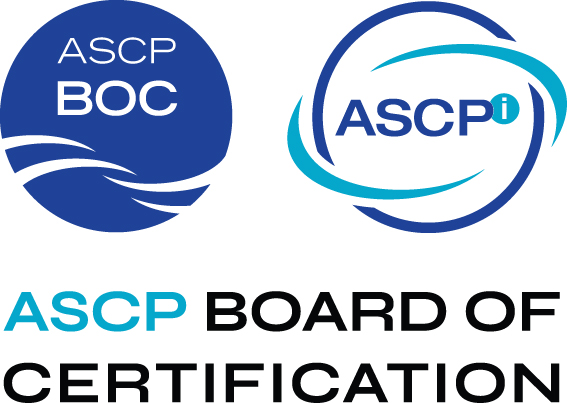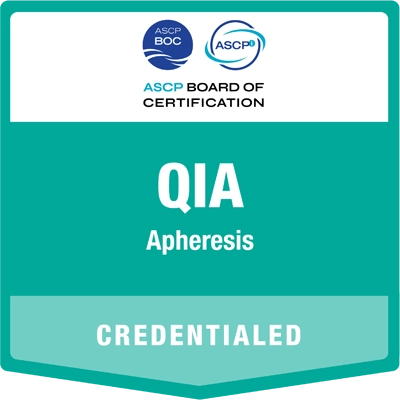Obtain certification and advance your career in apheresis with our specialized credential.
Expert in one or more areas of apheresis, both in the donor and therapeutic arenas. Areas of expertise include therapeutic procedures, collection of blood components, cellular reductions, and cellular collections.
Each credential has specific eligibility requirements. It’s your responsibility to confirm that your education, training, and/or experience meet the criteria. Submit the correct documentation with your application. Once submitted, the category and route of application cannot be changed.
Check Your EligibilityAn applicant must be able to verify that they meet all eligibility requirements, including education, training, and/or experience. For complete information, see the Documentation section of the website.
Education does not need to be from the United States. Details are available by reviewing the webpage titled Acceptable Education, also available in the routes below.
To be eligible for this examination category, an applicant must satisfy the minimum requirements (for degrees, the stated degree or higher) of at least one of the following routes:


RN, LPN, or LVN with U.S. state license, certificate, or diploma^,
AND 3 years of full-time acceptable experience in apheresis OR 5 years of part-time acceptable experience in apheresis within the last 10 years that must be documented on this Experience Documentation Form.
^Applicants must submit a copy of their official certificate, diploma, or license.
Experience
To fulfill the experience requirement for the Qualification in Apheresis examination,
you must have experience within the time frame required in at least one of the
following apheresis areas:
Professional nurse diploma or equivalent received outside of the U.S.^,
AND 3 years of full-time acceptable experience in apheresis OR 5 years of part-time acceptable experience in apheresis within the last 10 years that must be documented on this Experience Documentation Form.
^Applicants must submit a copy of their official certificate, diploma, or license.
Experience
To fulfill the experience requirement for the Qualification in Apheresis examination,
you must have experience within the time frame required in at least one of the
following apheresis areas:
Valid MLS(ASCP or ASCPi), BB(ASCP or ASCPi), SBB(ASCP or ASCPi), or MLT(ASCP or ASCPi) certification,
AND 3 years of full-time acceptable experience in apheresis OR 5 years of part-time acceptable experience in apheresis within the last 10 years that must be documented on this Experience Documentation Form.
Experience
To fulfill the experience requirement for the Qualification in Apheresis examination,
you must have experience within the time frame required in at least one of the
following apheresis areas:
Baccalaureate degree# from an accredited (regionally or nationally) college/university with a combination of 24 semester hours (36 quarter hours) in biology and chemistry, which may be obtained within, or in addition to, the baccalaureate degree,
AND 3 years of full-time acceptable experience in apheresis OR 5 years of part-time acceptable experience in apheresis within the last 10 years that must be documented on this Experience Documentation Form.
#The foreign degree must be equivalent to a U.S. degree which will be determined by an acceptable transcript evaluation.
Experience
To fulfill the experience requirement for the Qualification in Apheresis examination,
you must have experience within the time frame required in at least one of the
following apheresis areas:
MD^, DO^, or MBBS^,
AND 1 year of acceptable experience as an apheresis physician within the last 5 years that must be documented on this Experience Documentation Form.
^Applicants must submit a copy of their official certificate, diploma, or license.
Experience or Training
To fulfill the experience/training requirement for the Qualification in Apheresis examination, you must have experience/training in all of the following areas. Experience/training must be completed within the last 5 years.
MD^, DO^, or MBBS^,
AND training in a post-graduate medical education program which includes apheresis (e.g., transfusion medicine, hematology/oncology, nephrology, clinical pathology) within the last 5 years that must be documented on this Training Documentation Form.
^Applicants must submit a copy of their official certificate, diploma, or license.
Experience or Training
To fulfill the experience/training requirement for the Qualification in Apheresis examination, you must have experience/training in all of the following areas. Experience/training must be completed within the last 5 years.
High school graduation# or equivalent,
AND 5 years of full-time acceptable experience in apheresis within the last 10 years that must be documented on this Experience Documentation Form.
#The foreign degree must be equivalent to a U.S. degree which will be determined by an acceptable transcript evaluation.
Experience
To fulfill the experience requirement for the Qualification in Apheresis examination,
you must have experience within the time frame required in at least one of the
following apheresis areas:
You must upload the appropriate documentation form when you apply online, verifying that you meet the training and/or experience requirements for your category and route of application. You will also need to submit an acceptable transcript or transcript evaluation verifying that you meet the academic requirements. Gather your documents before submitting your application and application fee.
Once you have confirmed that you meet the requirements and have gathered your documents, submit your online application.
 |
In early 2026, the ASCP BOC will launch digital badging through Credly, a trusted provider that increases the visibility of ASCP BOC credential holders by securely showcasing and sharing professional credentials. Learn more about digital badges.
